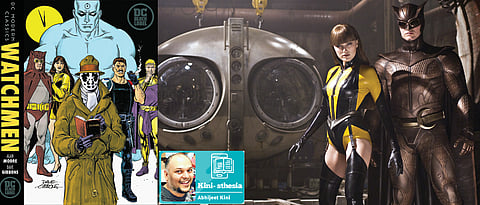

Every literary field has had a gold standard already established. The creators aim to get to the benchmark and surpass it someday. Music, cinema, theatre, books — they all have these. So, why should comics be left behind? In all of comics history and the trendsetters seen through the years, there have been a few epics. One of them being Alan Moore and Dave Gibbons’ Watchmen. This one is not just a comic book, Time magazine considers it one of the top 100 novels written!
At its very core, Watchmen talks about flaws. Flawed heroes, to be precise. When the 12 part mini-series came out in the ’80s, the market was saturated with superheroes, especially after the Golden and Silver Ages of comics which saw some sort of superhero renaissance (and a downward curve later).
Superman has seen a sea of change, first having his powers amped up and later being downgraded. Several titles were already cancelled owing to poor sales and low readership. In this scenario, came Watchmen. The eccentric genius that is Alan Moore, he presented a universe where superheroes existed in a very ‘real’ world. In other words, the question the book asks is, ‘What if we had superheroes amongst us in the real world, and what if none of them had any real superpower?’
Watchmen gives us superheroes who wear costumes but have no origin stories like kryptonite, lab-accidents, gamma radiation or any other sources of power. They are normal people, like you and I. What if we decided to wear colourful outfits and fight crime like vigilantes? How would society take it? The story of Watchmen is set during the Cold War. America and the (erstwhile) Soviet Union are on the brink of nuclear war and the Doomsday clock is barely minutes to midnight. And we have one true God-like being among us, who can make a difference (if he wants). That’s Dr Manhattan, the naked blue all-powerful ‘superhero’. Layers and layers of plots and storylines make this tale a deliciously complex one to read and understand.
Watchmen, to me, is like a lesson for comic writers and artists. The writing and the art complement each other so well, that sometimes the written word beautifully paints pictures in your head (especially the prose parts of the book, which have important plot details) and the art speaks to you without a word being said in the panel. The colours, the strokes and the layouts are terrific.
Watchmen was considered ‘unadaptable to the big screen’ and ‘unfilmable’ for a long time. That changed when Zack Snyder decided to give us the cinematic version in 2009. As many of his films tend to do, this one too polarised fans. Some loved the movie while some hated it. The iconic ending was changed drastically in the movie version, and that was my biggest grouse. Yet, the movie remains an example of how to faithfully adapt comic content to the big screen.
Now, HBO has a brand new TV series, called, you guessed it, Watchmen. When the promos were out, fans wondered what would a TV series bring to the table. The story was pretty much done, and frankly no one wants unnecessary sequels or what I call ‘milking the money cow’.
So, I did what any curious fan would do. I got myself a streaming platform membership and binged on the episodes out so far. If the original was about the Cold War, humanity, society, etc, this one goes a bit deeper in social fabric. Racism seems to be the main theme here. Damon Lindelof, the show creator, claims this show is not a remake but a remix. And a remix it is.
With a lot of throwbacks and Easter eggs peppered all along, the show has been marketed as something that a person who hasn’t read the comics can watch. Basically, it takes certain things from the original comic, but presents a completely new concept and storyline. As for the fans, they can’t seem to decide whether they like it or hate it. Nevertheless, it’s a daring direction Watchmen has gone in.
DC Comics is known for its darker take on superheroes, and now with their renewed interest in their Watchmen IP, we can brace ourselves for more such experiments. As it is, their official comic sequel to Watchmen, ie, the Doomsday Clock storyline is nearing its end. The TV show has given us a deeper look at this alternate reality which is the Watchmen universe.
As the line in the comic goes, ‘Who watches the Watchmen?’, I’d say, ‘We all do!’
(The writer is a comic creator, illustrator and animator)
